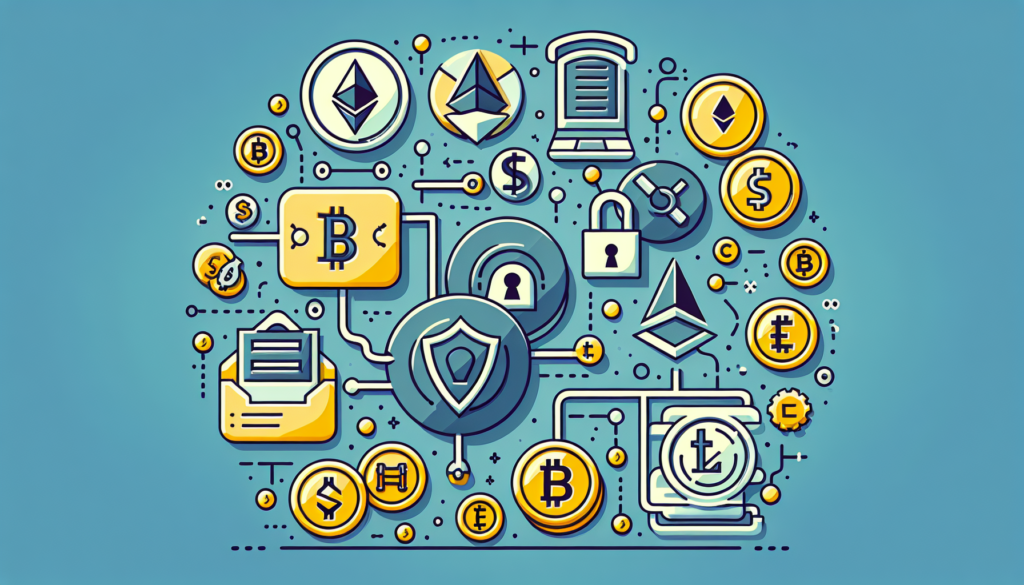The Ultimate Guide to Choosing the Best Crypto Wallet
Are you interested in investing in cryptocurrencies? With the rise in popularity of digital currencies, it’s crucial to have a secure and reliable crypto wallet. Whether you are a seasoned investor or a beginner, finding the best wallet for your needs can be a daunting task. But fret not! In this comprehensive guide, we will walk you through everything you need to know to make an informed decision. From explaining the different types of wallets to highlighting the key factors to consider, we’ve got you covered. So, get ready to embark on your crypto journey without any worries!
The Ultimate Guide to Choosing the Best Crypto Wallet

Types of Crypto Wallets
When it comes to cryptocurrencies, one of the most important aspects to consider is how you store and manage your digital assets. A crypto wallet plays a vital role in the security and accessibility of your funds. There are several types of crypto wallets available in the market today, each with its unique characteristics and features.
Hot Wallets
Hot wallets are digital wallets that are connected to the internet. They are designed for convenience and accessibility, allowing users to easily access their funds using various devices such as computers or mobile phones. However, hot wallets are more susceptible to hacking and online attacks compared to their cold counterparts.
Cold Wallets
Cold wallets, on the other hand, are offline wallets that offer a higher level of security. These wallets store your private keys and cryptocurrency offline, reducing the risk of being hacked. Cold wallets are often referred to as hardware wallets or paper wallets, which we will discuss in more detail later.
Hardware Wallets
Hardware wallets are physical devices that securely store your private keys offline. These devices are specifically designed to protect your cryptocurrencies from online threats such as malware or phishing attacks. Hardware wallets are often considered one of the safest methods to store and manage your digital assets.
Desktop Wallets
Desktop wallets, as the name suggests, are applications that you install and run on your desktop computer. They offer a convenient way to store and manage multiple cryptocurrencies, allowing you to have full control over your funds. However, desktop wallets require regular software updates and can be vulnerable to computer viruses or malware if proper security measures are not taken.
Mobile Wallets
With the increasing popularity of smartphones, mobile wallets have become a popular choice for crypto enthusiasts. These wallets are specifically designed for mobile devices and offer a user-friendly interface that allows you to manage your funds on the go. Mobile wallets are great for everyday transactions and are often compatible with popular cryptocurrencies and tokens.
Web Wallets
Web wallets, also known as online wallets, are wallets that can be accessed through a web browser. They provide easy access to your cryptocurrencies from any internet-connected device. However, web wallets are considered less secure compared to other types of wallets because they require you to trust the wallet provider with your private keys.
Paper Wallets
Paper wallets are a form of cold wallet where your private keys and public addresses are printed on a physical piece of paper. Since paper wallets are offline, they offer a high level of security against online threats. It’s important to keep your paper wallet in a safe and secure location to prevent loss or damage.
Custodial Wallets
Custodial wallets are wallets where a third-party entity holds your private keys on your behalf. These wallets are often offered by cryptocurrency exchanges or wallet service providers. While custodial wallets offer convenience and user-friendly features, they also involve trusting a centralized entity with your funds, which goes against the decentralized nature of cryptocurrencies.
Non-custodial Wallets
On the other hand, non-custodial wallets give you complete control over your private keys and funds. With non-custodial wallets, you are the sole custodian of your digital assets, which aligns with the fundamental principles of decentralization and security in the blockchain industry. Non-custodial wallets are often preferred by users who value privacy and control over their funds.
Multi-currency Wallets
Multi-currency wallets are designed to support multiple cryptocurrencies and tokens in a single wallet interface. This eliminates the need to manage multiple wallets for different cryptocurrencies, providing users with convenience and ease of use. Multi-currency wallets often have built-in exchange features, allowing you to swap or convert one cryptocurrency to another within the wallet itself.
Security Considerations
When it comes to choosing a crypto wallet, security should be one of your top priorities. Here are some key security considerations to keep in mind:
Private Keys
Private keys are the most important aspect of a crypto wallet. They are used to access and manage your digital assets. It’s crucial to choose a wallet that stores your private keys securely and allows you to have full control over them.
Two-Factor Authentication (2FA)
Two-factor authentication adds an extra layer of security to your wallet by requiring a second form of verification, such as a fingerprint or a code sent to your mobile device, in addition to your password. This helps protect your funds even if your password gets compromised.
Backup and Recovery
Having a reliable backup and recovery system is essential to ensure that you never lose access to your funds. Look for wallets that offer backup options, such as mnemonic phrases or seed backups, which can be used to restore your wallet in case of loss or theft.
Address Verification
Verifying the receiving addresses is crucial to avoid sending your cryptocurrencies to the wrong address or falling victim to phishing attacks. Make sure the wallet you choose has built-in address verification mechanisms to prevent any errors or scams.
Physical Security
For cold wallets or hardware wallets, physical security is vital. Ensure that the device or paper wallet is stored in a secure location, such as a safe or a physically locked drawer, to protect it from theft or damage.
Open Source Audits
Consider wallets that have undergone third-party security audits or have open-source code available for review. This enhances transparency and allows the crypto community to identify potential vulnerabilities or security risks.
Reputation and User Reviews
Research the reputation of the wallet provider and read user reviews to gauge the overall user experience and security of the wallet. Look for wallets that have a positive track record and a strong user community.
Cryptographic Standards
Check if the wallet follows industry-standard cryptographic protocols and uses encryption algorithms that have been proven to be secure. This ensures that your private keys and transactions are protected against potential attacks.
Reputation of Project Team
Evaluate the reputation and expertise of the team behind the wallet project. Look for wallets developed by reputable companies or individuals with a strong background in cybersecurity and blockchain technology.
Insurance Coverage
Some wallets offer insurance coverage, ensuring that even in the event of a breach or loss, your funds are protected. This provides an extra layer of security and peace of mind for wallet users.
User-Friendliness
Apart from security, user-friendliness is another important aspect to consider when choosing a crypto wallet. Here are some factors to assess:
User Interface
A well-designed and intuitive user interface can significantly enhance your wallet experience. Look for wallets that have a clean and user-friendly interface, making it easy to navigate and manage your funds.
Ease of Setup
Consider wallets that have a straightforward setup process, allowing you to quickly create a wallet and get started with managing your cryptocurrencies without any hassle.
Intuitive Design
The design and layout of the wallet should be intuitive and user-friendly. The wallet should make it easy for you to perform common tasks, such as sending and receiving funds, checking transaction history, and managing multiple addresses or assets.
Multilingual Support
If English is not your primary language, look for wallets that offer multilingual support. Having the wallet interface available in your native language can improve your overall experience and understanding of the wallet’s features.
Social Features
Some wallets offer social features such as the ability to send funds to friends or family members directly through the wallet interface. These social features can enhance your wallet experience by enabling easy and seamless transactions with your contacts.
Customer Support
Reliable customer support is crucial in case you encounter any issues or have questions regarding your wallet. Look for wallets that offer responsive and knowledgeable customer support through various channels such as email, live chat, or a dedicated support ticket system.
Compatibility with Platforms
Consider the compatibility of the wallet with different platforms. Look for wallets that are available for your preferred operating system, whether it’s Windows, macOS, Linux, iOS, or Android. Compatibility ensures that you can access and manage your funds on the devices you use regularly.
Integration with Exchanges
If you frequently trade cryptocurrencies on exchanges, consider wallets that have built-in integration with popular exchanges. This allows you to seamlessly transfer funds between your wallet and the exchange, eliminating the need for additional steps or transactions.
Transactional Features
Assess the transactional features offered by the wallet. Look for wallets that provide additional functionalities such as the ability to set custom transaction fees, schedule recurring payments, or create watch-only addresses.
Analytics and Reporting
Some wallets offer analytics and reporting features, allowing you to gain insights into your transaction history, asset allocation, or overall portfolio performance. These features can be beneficial for users who want to track their investments and monitor their crypto holdings closely.
Supported Cryptocurrencies and Tokens
The range of supported cryptocurrencies and tokens is an important consideration when choosing a crypto wallet. Here are some categories to evaluate:
Major Cryptocurrencies (Bitcoin, Ethereum, etc.)
Ensure that the wallet supports the major cryptocurrencies such as Bitcoin (BTC) and Ethereum (ETH). These cryptocurrencies serve as the backbone of the crypto market and are commonly accepted and traded.
Alternative Cryptocurrencies (Litecoin, Ripple, etc.)
If you hold or plan to invest in alternative cryptocurrencies like Litecoin (LTC) or Ripple (XRP), check if the wallet supports these assets. Having support for a wide range of alternative cryptocurrencies can provide you with more options for diversifying your holdings.
ERC-20 Tokens
Ethereum-based ERC-20 tokens have gained significant popularity, especially in the realm of decentralized finance (DeFi). If you participate in the DeFi ecosystem or own ERC-20 tokens, ensure that the wallet supports these tokens and allows you to manage them seamlessly.
Stablecoins
Stablecoins, such as Tether (USDT) or USD Coin (USDC), are crypto assets designed to maintain a stable value by pegging them to fiat currencies like the US dollar. If you frequently hold or transact in stablecoins, check if the wallet supports these assets.
Privacy-focused Cryptocurrencies
For users who prioritize privacy, ensure that the wallet supports privacy-focused cryptocurrencies such as Monero (XMR) or Zcash (ZEC). These cryptocurrencies offer additional layers of privacy and anonymity compared to transparent blockchains like Bitcoin or Ethereum.
Decentralized Finance (DeFi) Tokens
Decentralized finance has gained significant traction in the crypto ecosystem, with a wide variety of DeFi tokens available. If you actively participate in DeFi protocols or invest in DeFi tokens, check if the wallet supports these assets and provides easy access to DeFi functionalities.
Non-Fungible Tokens (NFTs)
Non-fungible tokens (NFTs) have revolutionized the world of digital art, collectibles, and gaming. If you own or plan to interact with NFTs, ensure that the wallet supports these unique digital assets, allowing you to store, manage, and trade them effectively.
Upcoming and Lesser-Known Cryptocurrencies
The crypto market is constantly evolving, with new cryptocurrencies and tokens being introduced regularly. If you are interested in investing in upcoming or lesser-known cryptocurrencies, check if the wallet supports these assets or has plans to add them in the future.
Custom Tokens
Some projects or blockchain networks create their own custom tokens. If you are involved in such projects or hold custom tokens, ensure that the wallet supports these tokens and allows you to store and manage them.
Cross-Chain Compatibility
Cross-chain compatibility allows you to interact with multiple blockchain networks using a single wallet. This feature is particularly important if you plan to use decentralized exchanges or participate in cross-chain DeFi protocols. Check if the wallet supports cross-chain functionality and allows you to manage assets across different blockchains.

Backup and Recovery Options
The ability to securely backup and recover your wallet is crucial to avoid losing access to your funds. Here are some backup and recovery options to consider:
Mnemonic Phrases
Mnemonic phrases, also known as seed phrases, are a series of words that represent your private keys. These phrases allow you to easily back up and restore your wallet. Look for wallets that use industry-standard mnemonic phrases and guide you through the backup process.
Seed Backup
Seed backup provides an additional layer of security by allowing you to create a physical backup of your mnemonic phrases or private keys. Consider wallets that offer seed backup options, such as a written copy or a recovery card, which can be stored in a secure location.
Passphrase Support
Passphrases are an extra security feature that can be added to your mnemonic phrases. They act as an additional password to access your wallet, providing an extra layer of protection. Look for wallets that support passphrase encryption and allow you to set up and manage passphrases easily.
Multi-Signature
Multi-signature (multisig) wallets require multiple signatures or approvals to initiate a transaction. This feature provides added security by requiring consensus among multiple authorized parties. If you value increased security and control, consider wallets that offer multi-signature functionality.
Automatic Backups
Automatic backup features ensure that your wallet is regularly backed up without manual intervention. Look for wallets that offer automatic backup options, either to a cloud storage service or a designated backup location. This helps protect your funds even if you forget to perform manual backups.
Hierarchical Deterministic (HD) Wallets
Hierarchical Deterministic (HD) wallets generate a new set of public-private key pairs for each transaction, improving privacy and security. HD wallets also make it easier to manage multiple addresses or wallets. Consider wallets that utilize HD wallet technology for enhanced security and convenience.
Offline Backup Options
If you prefer offline backups, look for wallets that offer offline backup options such as QR codes or encrypted file exports. These options allow you to securely back up your wallet data or private keys without relying on an internet connection.
Cloud Backup
Some wallets offer cloud backup options that automatically synchronize your wallet data across multiple devices. While convenient, it’s important to ensure that the cloud backup is encrypted and secure, protecting your private keys from unauthorized access.
Recovery Seed Import
When choosing a wallet, check if you can import an existing recovery seed from another wallet. This allows for seamless migration or recovery of funds without having to create a new wallet from scratch.
Integration with Blockchain Networks
Integration with blockchain networks is essential to ensure that your wallet can interact with different blockchains and participate in various activities. Consider the following factors:
Node Connectivity
Wallets that connect directly to blockchain nodes offer a higher level of security and decentralization. Check if the wallet supports direct node connectivity, allowing you to interact with the blockchain network without relying on a third-party service.
Chain Compatibility
Different blockchain networks have their own unique protocols and standards. Ensure that the wallet you choose is compatible with the specific blockchain network or networks you intend to use. This ensures that you can effectively store, send, and receive cryptocurrencies without any compatibility issues.
Blockchain Voting
Some blockchain networks employ a voting mechanism for on-chain governance. If you participate in blockchain voting or governance activities, consider wallets that support voting features and provide an easy interface to cast your votes.
Blockchain Governance
Blockchain governance involves decision-making processes within a blockchain network. Check if the wallet supports blockchain governance features, such as participating in token-holder voting or governance proposals.
Smart Contract Creation
If you are interested in developing or interacting with smart contracts, ensure that the wallet supports smart contract creation and execution. This allows you to participate in decentralized applications (dApps) and execute custom logic on the blockchain.
Delegated Proof-of-Stake (DPoS) Support
Delegated Proof-of-Stake (DPoS) is a consensus mechanism used by some blockchain networks. If you hold or plan to participate in DPoS-based networks, check if the wallet supports DPoS consensus and provides features to delegate or vote for block validators.
Access to Blockchain Events
For users who want to stay updated with blockchain events or notifications, check if the wallet provides features that allow you to receive real-time updates, such as transaction confirmations, network updates, or wallet activity alerts.
Blockchain Explorers
Blockchain explorers allow you to view and explore blockchain transactions, addresses, and other network information. Integration with blockchain explorers can enhance your wallet experience by providing convenient access to blockchain data.
Transaction Speed and Confirmation Time
Consider the transaction speed and confirmation time of the blockchain network your chosen wallet is integrated with. Some blockchains offer faster transaction processing times, which can be important for time-sensitive transactions or activities.
Costs and Fees
While most crypto wallets are free to use, there are certain costs and fees associated with wallet management and transactions. Consider the following factors:
Wallet Creation
Some wallets may charge a fee for the creation or activation of a new wallet. Evaluate if the wallet you choose has any wallet creation fees and consider if it aligns with your budget and requirements.
Transaction Fees
Transaction fees are charges incurred when sending or receiving cryptocurrencies. These fees vary depending on network congestion and transaction priority. Check if the wallet allows you to set custom transaction fees or offers fee optimization options, ensuring that you can choose the most appropriate fee for your needs.
Exchange Fees
If the wallet integrates with exchanges for trading or swapping cryptocurrencies, check if there are any exchange fees associated with these transactions. Consider wallets that offer competitive exchange rates and low fees to optimize your trading experience.
Network Fees
Network fees, also known as gas fees in Ethereum-based networks, are charges imposed by the blockchain network for processing transactions. These fees can fluctuate depending on network demand. Evaluate wallets that allow you to adjust network fees or provide fee estimation to optimize your transaction costs.
Conversion Fees
Conversion fees are charges incurred when exchanging one cryptocurrency for another within the wallet interface. If the wallet offers built-in exchange features, assess the conversion fees to ensure they are competitive and reasonable.
Subscription Fees
Some wallets offer premium or advanced features through subscription plans. If you require additional functionalities or exclusive benefits, check if the wallet offers subscription options and evaluate if the benefits justify the subscription fees.
Withdrawal and Deposit Fees
Certain wallets may impose withdrawal or deposit fees for specific cryptocurrencies or tokens. Check the fee structure of the wallet and consider if the fees align with your usage patterns or trading activities.
Third-Party Service Integration Fees
If the wallet integrates with third-party services such as portfolio trackers or tax reporting tools, check if there are any fees associated with these integrations. Be aware of any additional costs incurred when using these external services.
Additional Services and Premium Features
Some wallets offer additional services or premium features that come with associated costs. Evaluate if these services or features are relevant to your needs and consider if the benefits outweigh the additional costs.
Price Comparison
Considering the costs and fees associated with different wallets can be complex. Conduct thorough research and compare the costs of different wallets to find the one that best suits your budget and requirements.
Privacy and Anonymity
Privacy and anonymity are crucial considerations for many crypto users. Here are some factors to evaluate:
Identity Verification
Some wallets require identity verification in compliance with Know Your Customer (KYC) or Anti-Money Laundering (AML) regulations. If privacy is a top priority for you, consider wallets that offer more anonymous options without requiring extensive personal information.
KYC and AML Compliance
For users who prioritize compliance with regulatory requirements, check if the wallet follows KYC and AML procedures. This ensures that your wallet activities align with legal regulations and reduces the risk of your funds being frozen or seized.
Privacy-Focused Features
Look for wallets that prioritize privacy and offer features such as private transactions, coin mixing, or enhanced privacy protocols. These features can help ensure that your transactions and holdings are kept private and secure.
Tor Network Support
If you value privacy, consider wallets that offer Tor network support. The Tor network can help anonymize your internet traffic and protect your identity when accessing your wallet or conducting transactions.
Onion Routing
Onion routing is a technique used to hide the origin and destination of internet traffic. Some wallets utilize onion routing or similar privacy-enhancing technologies to protect your transactions and wallet activities.
Coin Mixing
Coin mixing, also known as coin tumbling, is a process that helps obfuscate the transaction history of your cryptocurrencies. If privacy is a priority for you, consider wallets that offer built-in coin mixing services or support external coin mixing platforms.
Address Reuse Prevention
Reusing the same cryptocurrency address for multiple transactions can compromise your privacy and make it easier to trace your transaction history. Look for wallets that encourage or enforce address reuse prevention, ensuring that each transaction uses a unique address.
Coin Tumbling
Coin tumbling is another method used to enhance privacy by obfuscating the blockchain trail of your transactions. Consider wallets that offer built-in coin tumbling features or support external coin tumbling services.
Stealth Addresses
Stealth addresses provide an extra layer of privacy by allowing you to generate unique, one-time addresses for each transaction. This makes it difficult for third parties to link your transactions together. Look for wallets that support stealth addresses for improved privacy.
Privacy Policy and Data Protection
Carefully review the wallet’s privacy policy and data protection practices. Ensure that the wallet provider takes the necessary steps to protect your personal information and does not share it with third parties without your consent.
Reviews and Recommendations
When choosing a crypto wallet, it’s essential to consider reviews and recommendations from experts and other users. Here are some valuable sources to consult:
Independent Expert Reviews
Expert reviews provide insights into the features, security, and overall performance of different wallets. Look for reviews from reputable sources such as cryptocurrency news outlets, technology publications, or renowned blockchain experts.
User Reviews and Ratings
User reviews and ratings can offer valuable insights into the user experience and satisfaction with various wallets. Consider platforms such as app stores, cryptocurrency forums, or community discussion groups to read user reviews and gather feedback.
Trustworthy Sources
Ensure that the sources you consult for reviews and recommendations are trustworthy and reliable. Look for reviews from established publications or reputable cryptocurrency and blockchain communities.
Comparison Websites
Comparison websites can help you evaluate different wallets side by side by providing detailed feature comparisons and user reviews. Consult reputable comparison websites to narrow down your options and make an informed decision.
Top Wallet Lists
Some websites publish curated lists of top wallets based on various criteria such as security, user-friendliness, or supported cryptocurrencies. These lists can provide a good starting point for your wallet selection process.
Security Audits
Check if the wallet has undergone security audits conducted by independent third-party firms. Security audits help identify potential vulnerabilities or weaknesses in the wallet’s security infrastructure, providing valuable insights into its overall security.
Forums and Community Discussions
Engaging in cryptocurrency forums or community discussions allows you to interact with experienced users and gather insights on different wallets. These platforms often provide real-world experiences and opinions from users who have firsthand knowledge of specific wallets.
Social Media Recommendations
Social media platforms such as Twitter, Reddit, or Telegram are popular channels where users discuss different wallets and share recommendations. Participate in these conversations to get a sense of community sentiment and gather recommendations.
Word-of-Mouth Recommendations
Reach out to your friends, family, or colleagues who are experienced in cryptocurrencies and ask for their recommendations. Personal recommendations from trusted individuals can provide valuable insights and help you make an informed decision.
Cryptocurrency Influencer Opinions
Cryptocurrency influencers and experts often share their opinions and recommendations on different wallets. While it’s important to approach influencer opinions critically, they can provide valuable insights and help you discover new wallet options.
Future Development and Updates
The crypto industry is constantly evolving, with new technologies, features, and innovations being introduced regularly. Consider the following factors regarding a wallet’s future development:
Roadmap and Project Plans
Evaluate the wallet’s roadmap and future development plans. Look for wallets with a clear vision and a well-defined roadmap that outlines upcoming features, enhancements, or integrations.
Regular Updates and Bug Fixes
Regular updates ensure that the wallet remains secure, stable, and up to date with the latest industry standards. Check if the wallet has a history of regular updates, bug fixes, and security patches.
Feature Expansion
Consider wallets that have a track record of expanding their feature set to meet the evolving needs of users. A wallet that continuously improves and introduces new functionalities can enhance your wallet experience and keep you up to date with the latest industry trends.
Collaboration with Other Projects
Collaborations and partnerships with other projects or blockchain networks can enhance the functionality and interoperability of a wallet. Check if the wallet collaborates with other projects to provide additional features or integrations.
Partnerships and Integrations
Partnerships with reputable companies or integration with popular platforms, such as exchanges or payment processors, can provide added convenience and functionality to a wallet. Evaluate if the wallet has established partnerships or integrations that align with your usage patterns.
Developer Community Engagement
An active and engaged developer community can contribute to the improvement and development of a wallet. Consider wallets that encourage developer community engagement through open-source projects, developer grants, or bug bounty programs.
Open Source Projects
Open-source wallets provide transparency and allow the community to review, audit, and contribute to the codebase. If you value community-driven development and transparency, consider wallets that are open source or have open-source components.
User Feedback and Feature Requests
Consider wallets that actively seek user feedback and incorporate user feature requests into their development process. A wallet that listens to its users and implements requested features can provide a tailored and user-centric experience.
Adoption and User Growth
The adoption and user growth of a wallet can be indicative of its popularity and reliability. Look for wallets that have a growing user base and are widely used within the crypto community.
Market Trends and Innovations
Stay informed about the latest market trends and innovations in the crypto industry. Consider wallets that align with emerging trends such as decentralized finance (DeFi), non-fungible tokens (NFTs), or the integration of new blockchain networks.
In conclusion, choosing the best crypto wallet involves careful consideration of factors such as security, user-friendliness, supported cryptocurrencies, backup and recovery options, integration with blockchain networks, costs and fees, privacy and anonymity, reviews and recommendations, and future development plans. By thoroughly evaluating these aspects, you can find a wallet that meets your specific needs and provides a secure and convenient way to manage your digital assets. Remember to stay informed about the latest industry trends and innovations to ensure you stay ahead in the dynamic world of cryptocurrencies. Happy wallet hunting!
















It's great that you talked about how business insurance can provide financial protection against unexpected events and help ensure the…
I like that you mentioned how business insurance is essential for protecting your bottom line and the long-term viability of…